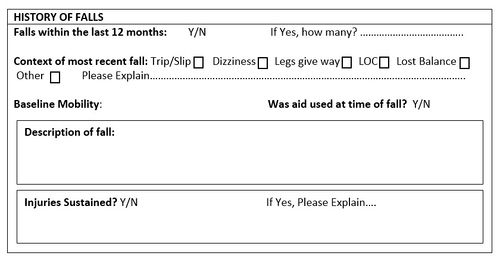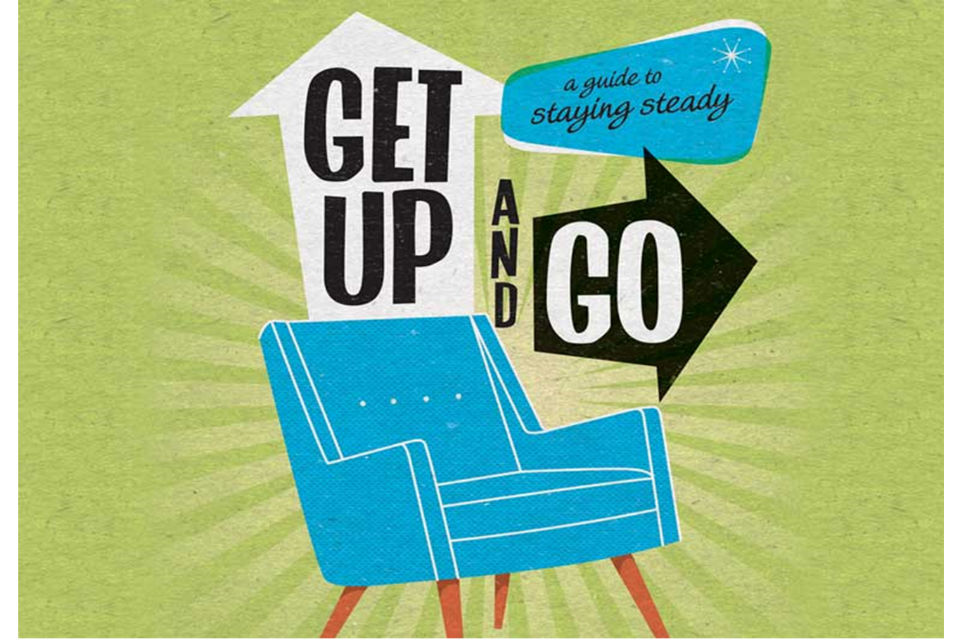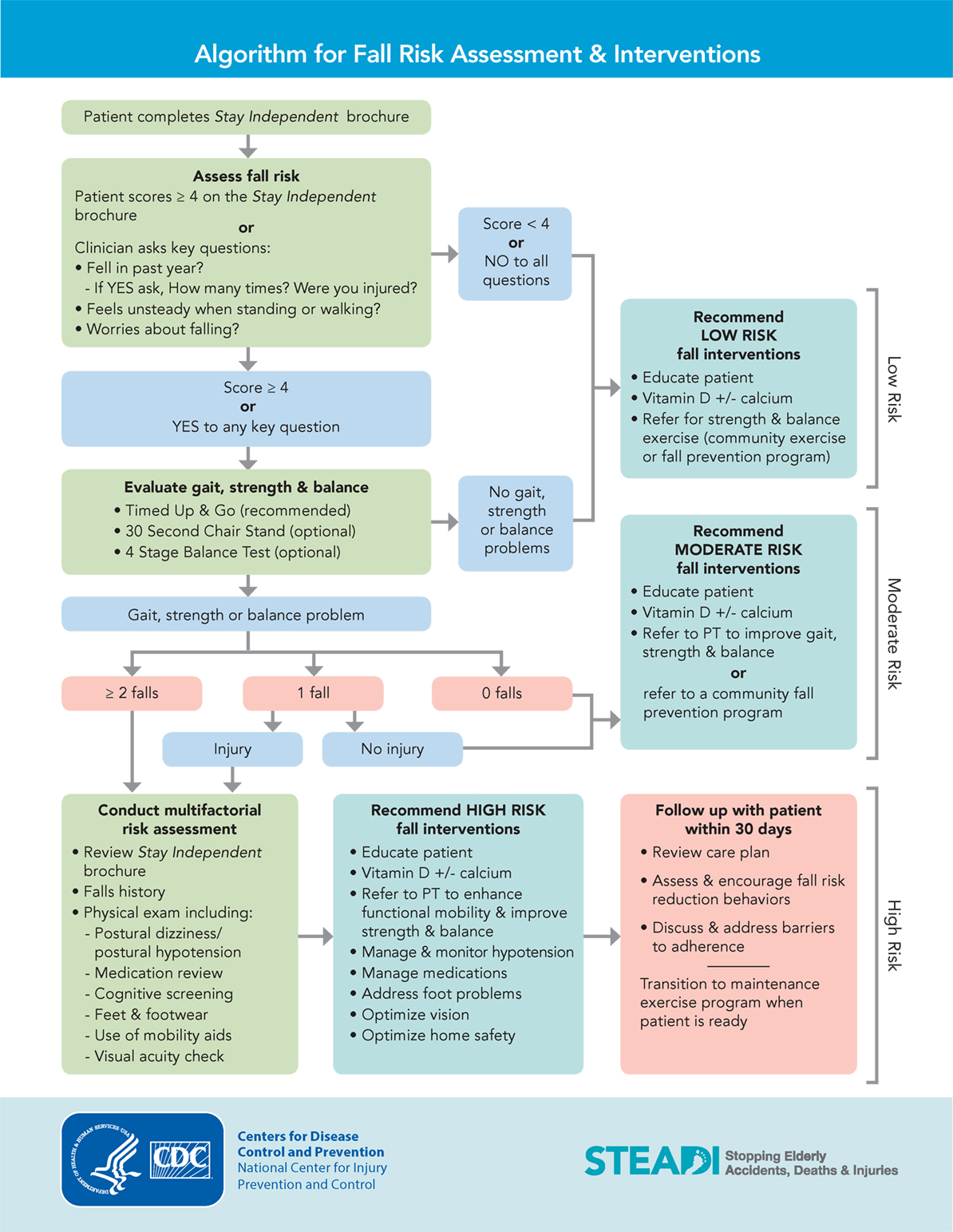Dementia Fall Risk Fundamentals Explained
Dementia Fall Risk Fundamentals Explained
Blog Article
Dementia Fall Risk for Dummies
Table of ContentsThe Ultimate Guide To Dementia Fall RiskThe Best Strategy To Use For Dementia Fall RiskHow Dementia Fall Risk can Save You Time, Stress, and Money.Getting My Dementia Fall Risk To WorkIndicators on Dementia Fall Risk You Should Know
In the area, poor road illumination or unprotected creeks and garbage dumps may additionally cause crashes. Loss Danger Evaluation Tool (FRAT) is a 4-item falls-risk screening device for sub-acute and household treatment. The FRAT has three areas: fall risk standing, threat element checklist, and action plan. A Fall Threat Condition consists of information about background of current drops, medicines, psychological and cognitive condition of the patient.If the client ratings on a threat variable, the equivalent variety of factors are counted to the patient's autumn risk rating in package to the far ideal. If a client's autumn threat rating amounts to 5 or greater, the individual goes to high risk for falls. If the client scores only 4 factors or lower, they are still at some risk of dropping, and the registered nurse must utilize their finest clinical analysis to handle all autumn threat factors as component of a holistic treatment strategy.
These standard approaches, in basic, help develop a secure atmosphere that decreases accidental falls and marks core preventive steps for all people. Signs are essential for clients at danger for falls.
Some Known Details About Dementia Fall Risk
Wristbands ought to include the person's last and first name, date of birth, and NHS number in the UK. Just red color ought to be used to signify unique patient status.
Products that are as well far may call for the individual to connect or ambulate needlessly and can possibly be a risk or contribute to falls. Helps protect against the client from heading out of bed without any kind of help. Nurses respond to fallers' telephone call lights a lot more swiftly than they do to lights started by non-fallers.
Visual disability can considerably cause falls. Hip pads, when used effectively, might reduce a hip fracture when loss happens. Keeping the beds closer to the floor minimizes the risk of falls and severe injury. Placing the bed mattress on the floor considerably reduces fall risk in some medical care settings. Low beds are designed to decrease the distance a patient falls after relocating out of bed.
Facts About Dementia Fall Risk Revealed
Clients that are high and with weak leg muscle mass that try to rest on the bed from a standing position are most likely to fall onto the bed because it's as well reduced for them to lower themselves safely. Likewise, if a high individual attempts to get up from a reduced bed without assistance, the client is most likely to fall back down onto the bed or miss the bed and fall onto the flooring.
They're developed to advertise prompt rescue, not to protect against falls from bed. Aside from bed alarm systems, enhanced supervision for high-risk clients likewise may help prevent drops.

Clients with an evasion recommended you read stride boost fall chances dramatically. To lower loss danger, shoes need to be with a little to no heel, slim soles with slip-resistant walk, and support the ankles. Recommend individual to make use of nonskid socks to stop the feet from gliding upon standing. Encourage patients to wear ideal, well-fitting shoesnot nonskid socks for you could check here ambulation.
Dementia Fall Risk - Questions
Clients, particularly older adults, have reduced aesthetic capability. Lighting a strange setting aids enhance visibility if the client must rise at evening. In a research, homes with adequate illumination record fewer falls (Ramulu et al., 2021). Enhancement in lighting in your home may reduce loss prices in older adults (Dementia Fall Risk). Using stride belts by all healthcare suppliers can promote security when aiding patients with transfers from bed to chair.

Caretakers work for ensuring a safe and secure, safeguarded, and risk-free environment. Studies demonstrated very low-certainty evidence that caretakers decrease autumn danger in acute treatment health centers and only moderate-certainty that options like video clip monitoring can reduce sitter use without boosting loss threat, suggesting that caretakers are not as beneficial as initially thought (Greely et al., 2020).
Everything about Dementia Fall Risk

Enhanced physical conditioning decreases the danger for falls and restricts injury that is sustained when loss takes place. Land and water-based workout programs might be in a similar way beneficial on balance and stride and thus decrease the threat for drops. Water exercise may add a favorable advantage on balance and stride for females 65 years and older.
Chair Increase Workout is a basic sit-to-stand workout that aids reinforce the muscle mass in the thighs and butts and boosts movement and independence. The goal is to do Chair Surge workouts without making use of hands as the client ends up being more powerful. See sources section for a detailed guideline on just how to execute Chair Rise exercise.
Report this page